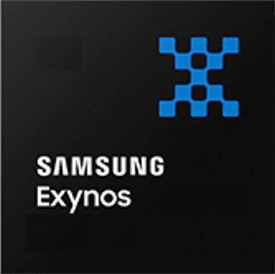
Samsung Exynos 9810 Benchmark, Test and specs
Last updated:
The Samsung Exynos 9810 has 8 cores with 8 threads and is based on the 3. gen of the Samsung Exynos series. The processor was released in Q1/2018. The Samsung Exynos 9810 scores 601 points in the Geekbench 5 single-core benchmark. In the Geekbench 5 multi-core benchmark, the result is 1,913 points.

| Name: | Samsung Exynos 9810 |
|---|---|
| Family: | Samsung Exynos (46) |
| CPU group: | Samsung Exynos 9810 (1) |
| Architecture: | Exynos M3 / Cortex-A55 |
| Segment: | Mobile |
| Generation: | 3 |
| Predecessor: | -- |
| Successor: | -- |
CPU Cores and Base Frequency
The Samsung Exynos 9810 has 8 CPU cores and can calculate 8 threads in parallel. The clock frequency of the Samsung Exynos 9810 is 2.90 GHz. The number of CPU cores greatly affects the speed of the processor and is an important performance indicator.
| CPU Cores / Threads: | 8 / 8 |
|---|---|
| Core architecture: | hybrid (big.LITTLE) |
| A-Core: | 4x Exynos M3 (Meerkat) |
| B-Core: | 4x Cortex-A55 |
| Hyperthreading / SMT: | No |
|---|---|
| Overclocking: | No |
| A-Core Frequency: | 2.90 GHz |
| B-Core Frequency: | 1.90 GHz |
Internal Graphics
The Samsung Exynos 9810 has integrated graphics, called iGPU for short. Specifically, the Samsung Exynos 9810 uses the ARM Mali-G72 MP18, which has 288 texture shaders and 18 execution units. The iGPU uses the system's main memory as graphics memory and sits on the processor's die.
| GPU name: | ARM Mali-G72 MP18 |
|---|---|
| GPU frequency: | 0.85 GHz |
| GPU (Turbo): | 0.85 GHz |
| Compute units: | 18 |
| Shader: | 288 |
| Hardware Raytracing: | No |
| Release date: | Q3/2017 |
| Max. displays: | 2 |
|---|---|
| Generation: | Bifrost 2 |
| Direct X: | 12 |
| Technology: | 16 nm |
| Max. GPU Memory: | 2 GB |
| Frame Generation: | No |
Hardware codec support
A photo or video codec that is accelerated in hardware can greatly accelerate the working speed of a processor and extend the battery life of notebooks or smartphones when playing videos.
| h265 / HEVC (8 bit): | Decode / Encode |
|---|---|
| h265 / HEVC (10 bit): | Decode / Encode |
| h264: | Decode / Encode |
| VP8: | Decode / Encode |
| VP9: | Decode / Encode |
| AV1: | No |
|---|---|
| AVC: | Decode / Encode |
| VC-1: | Decode / Encode |
| JPEG: | Decode / Encode |
Memory & PCIeThe processor can use up to 8 GB memory in 4 (Quad Channel) memory channels. The maximum memory bandwidth is --. The memory type as well as the amount of memory can greatly affect the speed of the system. |
|
| Memory type: | Memory bandwidth: |
|---|---|
| LPDDR4X-1866 | -- |
| Max. Memory: | 8 GB |
| Memory channels: | 4 (Quad Channel) |
| ECC: | No |
| PCIe: | |
| PCIe Bandwidth: | -- |
Thermal ManagementThe thermal design power (TDP for short) of the processor is . The TDP specifies the necessary cooling solution that is required to cool the processor sufficiently. The TDP usually gives a rough idea of the actual power consumption of the CPU. |
|
|---|---|
| TDP (PL1 / PBP): | |
| TDP (PL2): | -- |
| TDP up: | -- |
| TDP down: | -- |
| Tjunction max.: | -- |
Technical details
The Samsung Exynos 9810 is made in 10 nm. The smaller the manufacturing process of a CPU, the more modern and energy-efficient it is. Overall, the processor has 6.25 MB cache. A large cache can greatly speed up the processor's speed in some cases such as games.
| Technology: | 10 nm |
|---|---|
| Chip design: | |
| Socket: | -- |
| L2-Cache: | 2.25 MB |
| L3-Cache: | 4.00 MB |
| AES-NI: | No |
| Operating systems: | Android |
| Virtualization: | None |
|---|---|
| Instruction set (ISA): | Armv8-A (64 bit) |
| ISA extensions: | -- |
| Release date: | Q1/2018 |
| Release price: | -- |
| Part Number: | -- |
| Documents: | Technical data sheet |
Rate this processor
Benchmark results

The benchmark results for the Samsung Exynos 9810 have been carefully checked by us. We only publish benchmark results that have been created by us or that have been submitted by a visitor and then checked by a team member. All results are based on and fullfill our benchmark guidelines.
Geekbench 5, 64bit (Single-Core)
Geekbench 5 is a cross plattform benchmark that heavily uses the systems memory. A fast memory will push the result a lot. The single-core test only uses one CPU core, the amount of cores or hyperthreading ability doesn't count.

|
Intel Xeon E5-2620 v2
6C 12T @ 2.60 GHz |
||

|
AMD Athlon X4 845
4C 4T @ 3.80 GHz |
||

|
Intel Xeon D-1518
4C 8T @ 2.20 GHz |
||
|
|
Samsung Exynos 9810
8C 8T @ 2.90 GHz |
||

|
AMD Ryzen Embedded V1500B
4C 8T @ 2.20 GHz |
||

|
Intel Pentium G3240T
2C 2T @ 2.70 GHz |
||

|
MediaTek Dimensity 1000C
8C 8T @ 2.00 GHz |
||
Geekbench 5, 64bit (Multi-Core)
Geekbench 5 is a cross plattform benchmark that heavily uses the systems memory. A fast memory will push the result a lot. The multi-core test involves all CPU cores and taks a big advantage of hyperthreading.

|
Qualcomm Snapdragon 750G
8C 8T @ 2.20 GHz |
||

|
Intel Core i7-7600U
2C 4T @ 3.90 GHz |
||

|
AMD FX-6300
6C 6T @ 4.10 GHz |
||
|
|
Samsung Exynos 9810
8C 8T @ 2.90 GHz |
||

|
Intel Core i7-6567U
2C 4T @ 3.00 GHz |
||
|
|
HiSilicon Kirin 810
8C 8T @ 2.20 GHz |
||

|
Intel Core i7-6660U
2C 4T @ 2.40 GHz |
||
Geekbench 6 (Single-Core)
Geekbench 6 is a benchmark for modern computers, notebooks and smartphones. What is new is an optimized utilization of newer CPU architectures, e.g. based on the big.LITTLE concept and combining CPU cores of different sizes. The single-core benchmark only evaluates the performance of the fastest CPU core, the number of CPU cores in a processor is irrelevant here.

|
Intel Pentium 2030M
2C 2T @ 2.50 GHz |
||

|
Intel Pentium B980
2C 2T @ 2.40 GHz |
||

|
Intel Core i3-2120T
2C 4T @ 2.60 GHz |
||
|
|
Samsung Exynos 9810
8C 8T @ 2.90 GHz |
||

|
UNISOC T700
8C 8T @ 1.80 GHz |
||

|
Qualcomm Snapdragon 680 4G
8C 8T @ 2.40 GHz |
||

|
Qualcomm Snapdragon 835
8C 8T @ 2.45 GHz |
||
Geekbench 6 (Multi-Core)
Geekbench 6 is a benchmark for modern computers, notebooks and smartphones. What is new is an optimized utilization of newer CPU architectures, e.g. based on the big.LITTLE concept and combining CPU cores of different sizes. The multi-core benchmark evaluates the performance of all of the processor's CPU cores. Virtual thread improvements such as AMD SMT or Intel's Hyper-Threading have a positive impact on the benchmark result.

|
Intel Celeron N5105
4C 4T @ 2.60 GHz |
||

|
Intel Atom C5315
4C 4T @ 2.40 GHz |
||

|
Intel Core m3-6Y30
2C 4T @ 1.80 GHz |
||
|
|
Samsung Exynos 9810
8C 8T @ 2.90 GHz |
||

|
Intel Core i7-880
4C 8T @ 3.06 GHz |
||

|
Intel Core i5-4260U
2C 4T @ 2.70 GHz |
||

|
Qualcomm Snapdragon 680 4G
8C 8T @ 2.40 GHz |
||
iGPU - FP32 Performance (Single-precision GFLOPS)
The theoretical computing performance of the internal graphics unit of the processor with simple accuracy (32 bit) in GFLOPS. GFLOPS indicates how many billion floating point operations the iGPU can perform per second.

|
AMD Ryzen 9 7950X
AMD Radeon Graphics (Raphael) @ 2.20 GHz |
||

|
Intel Core i5-1034G1
Intel UHD Graphics (Ice Lake G1) @ 1.05 GHz |
||

|
Intel Core i5-1035G1
Intel UHD Graphics (Ice Lake G1) @ 1.05 GHz |
||
|
|
Samsung Exynos 9810
ARM Mali-G72 MP18 @ 0.85 GHz |
||

|
Intel Core i3-12300T
Intel UHD Graphics 730 @ 1.45 GHz |
||

|
Intel Core i3-12300
Intel UHD Graphics 730 @ 1.45 GHz |
||

|
Intel Core i5-12400T
Intel UHD Graphics 730 @ 1.45 GHz |
||
AnTuTu 8 Benchmark
The AnTuTu 8 Benchmark measures the performance of a SoC. AnTuTu benchmarks the CPU, GPU, Memory as well as the UX (User Experience) by simulating browser and app usage. AnTuTu can benchmark any ARM CPU that runs under Android or iOS. Devices may not be directly compareable if the benchmark has been performed under different operating systems.
In the AnTuTu 8 benchmark, the single-core performance of a processor is only slightly weighted. The evaluation consists of the multi-core performance of the processor, the speed of the RAM and the performance of the internal graphics.
In the AnTuTu 8 benchmark, the single-core performance of a processor is only slightly weighted. The evaluation consists of the multi-core performance of the processor, the speed of the RAM and the performance of the internal graphics.

|
Samsung Exynos 980
8C 8T @ 2.20 GHz |
||

|
MediaTek Dimensity 700
8C 8T @ 2.20 GHz |
||

|
Qualcomm Snapdragon 765G
8C 8T @ 2.40 GHz |
||
|
|
Samsung Exynos 9810
8C 8T @ 2.90 GHz |
||

|
MediaTek Dimensity 800
8C 8T @ 2.00 GHz |
||
|
|
HiSilicon Kirin 810
8C 8T @ 2.20 GHz |
||

|
MediaTek Helio G95
8C 8T @ 2.05 GHz |
||
Estimated results for PassMark CPU Mark
Some of the CPUs listed below have been benchmarked by CPU-monkey. However the majority of CPUs have not been tested and the results have been estimated by a CPU-monkey’s secret proprietary formula. As such they do not accurately reflect the actual Passmark CPU mark values and are not endorsed by PassMark Software Pty Ltd.

|
Intel Core i7-7600U
2C 4T @ 3.90 GHz |
||

|
Intel Core i7-6660U
2C 4T @ 2.40 GHz |
||

|
Intel Core i7-7560U
2C 4T @ 3.70 GHz |
||
|
|
Samsung Exynos 9810
8C 8T @ 2.90 GHz |
||

|
Samsung Exynos 9825
8C 8T @ 2.73 GHz |
||

|
Intel Core i5-7300U
2C 4T @ 3.50 GHz |
||

|
AMD Ryzen 3 2200U
2C 4T @ 2.50 GHz |
||
Benchmarks

Geekbench 5 (SC)
2,488 entries
2,488 entries

Geekbench 5 (MC)
2,461 entries
2,461 entries

Geekbench 6 (SC)
1,755 entries
1,755 entries

Geekbench 6 (MC)
1,703 entries
1,703 entries

FP32 SP (iGPU)
2,026 entries
2,026 entries

AnTuTu 8 Benchmark
118 entries
118 entries

PassMark CPU-Mark
2,392 entries
2,392 entries
Popular comparisons
back to index





